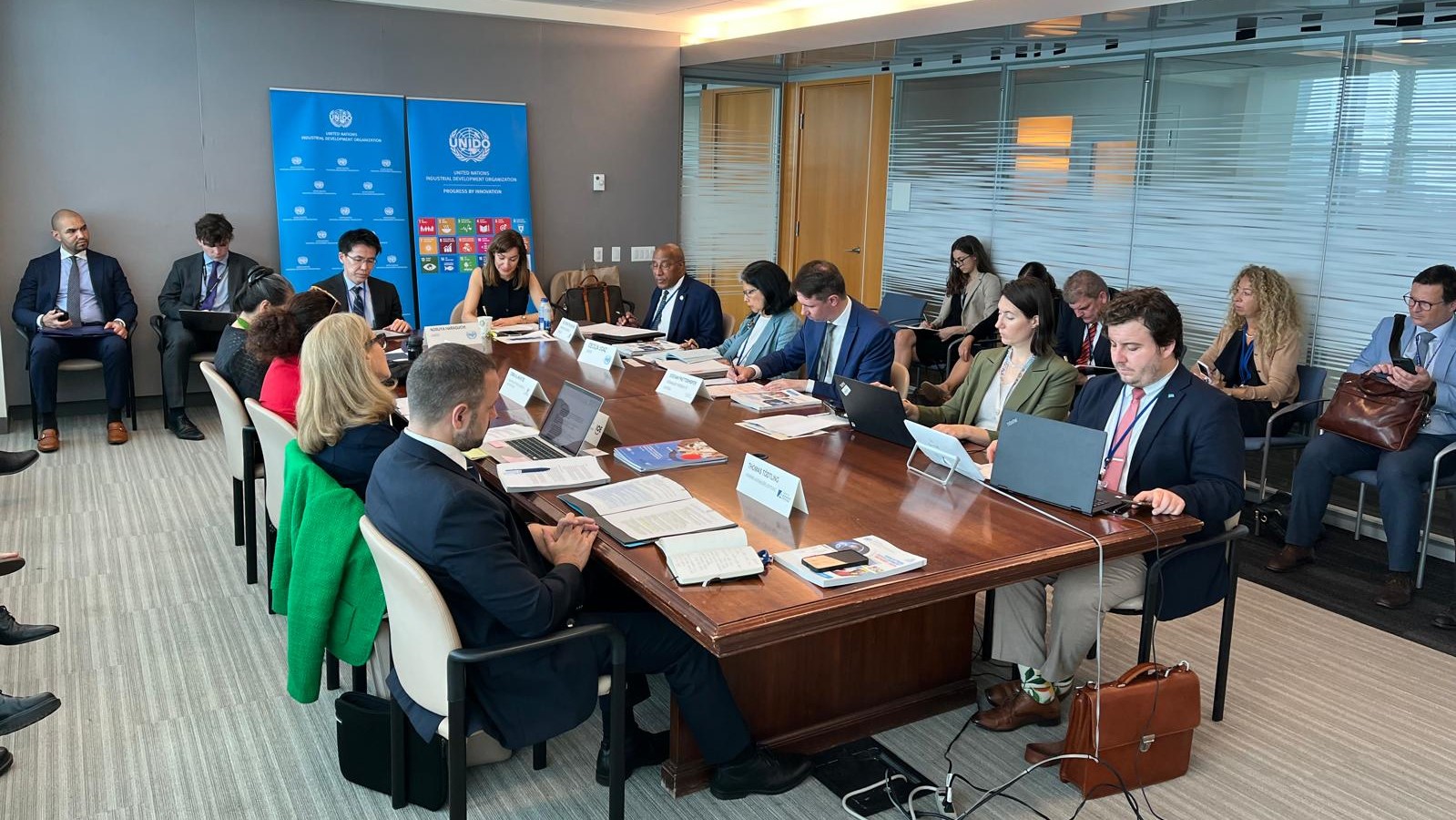UNIDO presents the Industrial Development Report 2024 at the High-level Political Forum (HLPF)
16 July 2024

New York, 15 July 2024 - The United Nations Industrial Development Organization (UNIDO) presented its Industrial Development Report (IDR) 2024 at the High-level Political Forum (HLPF) on sustainable development in New York. The side event was co-organized with the Permanent Missions of Ethiopia and Austria to the United Nations in New York, serving as co-chairs of the Group of Friends of Inclusive and Sustainable Industrial Development.
The IDR24, titled “Turning Challenges into Sustainable Solutions: The New Era of Industrial Policy”, emphasizes the critical role of industry in driving economic growth, innovation and job creation, and in advancing the Sustainable Development Goals (SDGs). Amid evolving global challenges and megatrends, the report advocates for modern industrial policies that can help guide nations towards achieving inclusive and sustainable development. Discussions focused on how a new era of SDG-oriented industrial policies can promote innovation (SDG 9), accelerate the green transition (SDG 13), transform food security and agri-food systems (SDG 2), and reduce poverty (SDG 1) by creating job opportunities, supporting sustainable supply chains and expanding markets, particularly in developing countries.
In her opening remarks, Ms. Cecilia Ugaz, Deputy to the Director General and Managing Director of UNIDO’s Directorate of Strategic Planning, Programming, and Policy, stressed, “Industry holds immense potential to tackle climate change, create decent jobs, alleviate poverty, and eradicate hunger worldwide. The IDR24 calls for a paradigm shift towards modern industrial policies that are collaborative, future-ready, SDG-oriented, and regionally coordinated.”
H.E. Mr. Tesfaye Yilma Sabo, Ambassador Extraordinary and Plenipotentiary Permanent Representative of Ethiopia, stated that the IDR24’s key messages closely align with Ethiopia’s 10-year development plan, which is synchronized with the SDGs. The plan aims to promote structural transformation, boost productivity, and create jobs by building a resilient and diversified economy with a robust manufacturing base.
Mr. Stefan Pretterhofer, Deputy Permanent Representative of Austria, commended UNIDO’s evidence-based research on inclusive and sustainable industrial development, highlighting that modern industrial policy is crucial for sustainable economic development, for identifying successful strategies to accelerate the SDGs and for assessing progress.
During his presentation on the IDR24’s key findings, Nobuya Haraguchi, Chief of UNIDO’s Industrial Policy Research and Statistics Division, noted that developing countries are falling behind in achieving the SDGs, especially in innovation, clean energy and employment. He asserted that modern industrial policies can address these challenges by fostering a thriving industry that spurs technological advancements, job creation and the green transition.
Speakers at the side event discussed how an innovation-led industry can accelerate the green transition and what actions the international community must take to bridge the innovation gap between developed and developing countries. They emphasized the role of agro-industry in enhancing agricultural productivity and reducing food insecurity, and the importance of equipping youth with future-ready skills.
Ms. Sakiko Fukuda-Parr, Professor of International Affairs at the New School and Member of the UN Committee for Development Policy, remarked “Innovation ecosystems must be reassessed to create effective frameworks, especially in developing countries, to fully untap their potential which is being underutilized. But innovation is not an end in itself, it must serve the purpose of sustainability and equity.”
Ms. Lilac Nachum, Professor at Baruch College, City University of New York, reflected on the role industry plays in increasing agricultural productivity. “Industrialization in regions like Africa should start with agribusiness, upgrading and upscaling to create manufacturing opportunities. The policy agenda must include upscaling, upgrading, and exporting to achieve development goals.”
Ms. Shea Gopaul, Permanent Representative to the UN for the International Organisation of Employers and Co-chair of the UN Business and Industry Major Group, and Mr. Thomas Tödtling, Representative to the UN and Executive Director of the New York Office at Konrad Adenauer Stiftung, underscored the importance of private sector collaboration in addressing complex and interconnected challenges.
Ms. Dima Al-Khatib, Director of the UN Office for South-South Cooperation, concluded the session by underlining the role of regional cooperation for industrialization. “Solutions rooted in local context and knowledge, shaped by stakeholders who understand their own needs, will be fundamental in achieving sustainable industrial growth.”
The full report and overview of the IDR24 can be found in https://www.unido.org/idr2024
For more information on the IDR, please contact:
Alejandro Lavopa, Research and Industrial Policy Officer